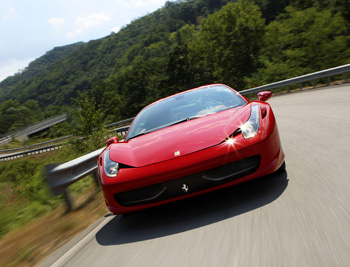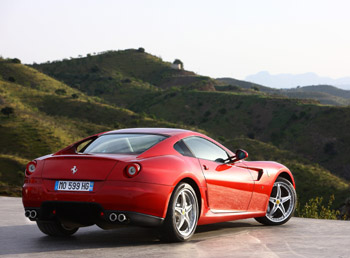
 |
|
As it counts down the final hours to the
release of the 458 Italia (top) in Frankfurt
today, Ferrari has been named as the sports
car manufacturer making the most
improvements over the last year in reducing
the CO2 emissions of its cars which include
the 599 GTB Fiorano (bottom). |
|
|
|
As
it counts down the final hours to the release of
the dramatic new 458 Italia in Frankfurt today,
Ferrari has been named as the sports car
manufacturer making the most improvements over
the last year in reducing the CO2 emissions of
its cars. While not traditionally associated
with their environmental credentials, sports car
makers are proving just as committed and
effective as volume brands in reducing their
average CO2 performance, according to a special
report released today by the world’s leading
provider of automotive data and intelligence,
JATO Dynamics.
JATO analysis
shows Ferrari leads the CO2 volume reduction race, with a
40.4 g/km improvement in CO2 output of new cars sold in H1
2009, compared to the same period in 2008. This is the
greatest volume reduction of any brand on sale in Europe and
represents a 9.5 percent improvement, which matches that of
the best performing volume brand of H1 2009, Chevrolet.
Ferrari’s net reduction puts it well on its way to achieving
its stated aim to reduce CO2 emissions from 400 g/km per
vehicle to 280-300 g/km, by 2012.
Commenting on
the figures, David Di Girolamo, Head of JATO Consult, says:
"Of course, supercars are starting from a high base and have
more scope to reduce emissions than mainstream cars, but the
speed with which they are improving their CO2 performance
should be credited." JATO was founded in 1984 and provides
the world’s most timely, accurate and up-to-date
intelligence on vehicle specifications and pricing, sales
and registrations, news and incentives.
"Sales volumes might
be on a smaller scale, but those manufacturers we studied
sell close to 100,000 cars combined each year, and we know
well that the days of supercar makers being excluded from
the environmental debate are over," he continues. "Of course
owners of these types of cars are also now acutely aware of
their own environmental responsibilities, although this is
clearly not top of the wish list when considering a
supercar."
JATO’s analysis
shows the scale of CO2 improvement made by the top supercar
makers, but also the effect of small sales volumes. While
Ferrari can claim the greatest CO2 volume reduction, when
expressed as percentage improvement, it is Alpina that is
the outright best performer, although on a small sales
base. The next best in percentage improvement is Porsche,
whose 10.6 percent reduction on a H1 2009 sales volume of
18,126 compares well to volume car makers.
Selected
Supercar Performers in Detail
|
BRAND |
VOL H1 2009 |
AV CO2 H1 2008 (g/ km) |
AV CO2 H1 2009 (g/ km) |
CO2 DIFF (g/ km) |
CO2 DIFF (%) |
|
ALPINA |
256 |
242.6 |
208.4 |
-34.2 |
14.1 |
|
PORSCHE |
18,126 |
290.2 |
259.5 |
-30.7 |
10.6 |
|
FERRARI |
1,783 |
427.4 |
386.9 |
-40.4 |
9.5 |
|
LAMBORGHINI |
337 |
413.1 |
374.1 |
-39.1 |
9.5 |
|
ASTON
MARTIN |
1,288 |
383.9 |
359.7 |
-24.2 |
6.3 |
|
ROLLS-ROYCE |
106 |
384.0 |
379.8 |
-4.3 |
1.1 |
|
BENTLEY |
762 |
408.4 |
406.2 |
-2.2 |
0.5 |
|
MASERATI |
1,264 |
343.5 |
364.4 |
+20.9 |
-6.1 |
|